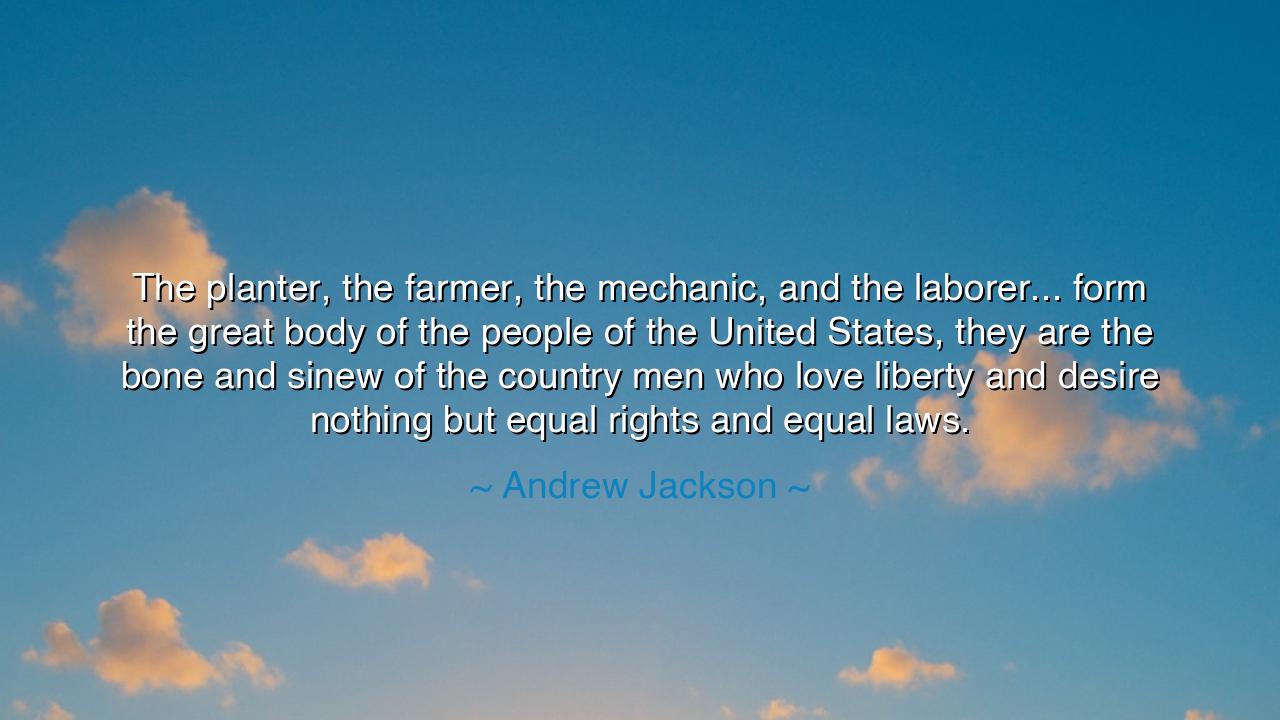
The planter, the farmer, the mechanic, and the laborer... form
The planter, the farmer, the mechanic, and the laborer... form the great body of the people of the United States, they are the bone and sinew of the country men who love liberty and desire nothing but equal rights and equal laws.






In the chronicles of a young republic, when the fires of revolution had cooled but the heart of freedom still beat strong, Andrew Jackson spoke words that echoed the soul of a nation: “The planter, the farmer, the mechanic, and the laborer... form the great body of the people of the United States, they are the bone and sinew of the country, men who love liberty and desire nothing but equal rights and equal laws.” In these words breathes the voice of the common man, the builder of nations, the unseen force that sustains all greatness. Jackson, born of humble roots and hardened by war and toil, did not speak from the marble halls of privilege, but from the dust of the fields and the forge of labor. His message was both a praise and a prophecy — that the true strength of any land lies not in its rulers or its riches, but in its workers, in those whose hands shape the destiny of the earth.
From the dawn of civilization, empires have risen upon the shoulders of such people — the planters who turn barren soil into abundance, the farmers who feed the hungry, the mechanics who forge the tools of progress, the laborers who lift stone upon stone to build the world’s monuments. They are the bone and sinew, the living structure of every nation. Without them, kings are powerless, laws are empty, and wealth turns to dust. Jackson’s words remind us that liberty is not born in palaces, but in the sweat of honest work — that freedom is sustained not by privilege, but by the steadfast toil of those who ask only for fairness and equality under heaven.
Consider the story of Thomas Paine, the writer whose pen kindled the American Revolution. Though not a general or nobleman, Paine came from humble stock — a corset maker by trade, a laborer in spirit. His voice, raised on behalf of the common man, stirred armies more than any drumbeat could. His words, like Jackson’s later, declared that the measure of a nation lies not in its aristocrats, but in the vigor of its working people. For when the farmer lays down his plow to defend his land, when the mechanic builds tools not for tyranny but for freedom, then liberty is not merely an idea — it becomes a living, breathing force.
Jackson spoke in an age of expansion and change, when America was still defining itself — a nation torn between old privilege and new opportunity. He saw in the working classes the embodiment of the democratic spirit — men and women who sought not to rule others, but to live as equals beneath just laws. He knew that their love of liberty was born not from books or theories, but from life itself — from the struggle to earn bread, from the pride of labor honestly done, from the faith that justice should belong to all. These were not the idle dreamers of empire, but the builders of freedom’s foundation.
Yet even as he praised them, Jackson’s vision carries a warning that speaks to every age: when the voice of the worker is ignored, when wealth corrupts the law and privilege replaces fairness, the nation begins to decay. A country that forgets its bone and sinew forgets itself. For without the laborer, the soil lies barren; without the mechanic, the forge grows cold; without equality, liberty withers into tyranny. The health of a republic depends not on how it treats its powerful, but how it honors its humble — how it protects the dignity of work and the fairness of law.
This truth has been tested time and again. In the factories of the Industrial Age, in the marches for labor rights, in the fields where migrant hands still sow and reap, the struggle continues — a testament that Jackson’s words are not relics, but living commandments. Each generation must choose whether it will honor the workers who sustain its prosperity, or exploit them for greed. The fate of freedom itself hangs upon that choice.
The lesson, therefore, is both ancient and eternal: respect the labor that builds the world. Remember that no progress, no invention, no government can stand without the honest work of its people. Whether you are a maker, a dreamer, or a leader, never look down upon the hands that build your future. To live rightly is to honor those hands, to fight for equal rights and equal laws, and to remember that liberty belongs not to the few, but to all who labor for it.
So, my children of the new dawn, if you would preserve freedom, cherish the planter, the farmer, the mechanic, and the laborer. Speak not in praise of power, but in gratitude for effort. Build a world where the sweat of the brow is sacred, and where justice is blind to birth and wealth alike. For only when every hand is valued, and every voice is heard, shall a nation truly live — strong, united, and free.






AAdministratorAdministrator
Welcome, honored guests. Please leave a comment, we will respond soon